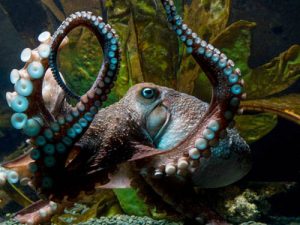Octopuses Are Highly Intelligent. Should They Be Farmed for Food?

Inky the octopus before he escaped the National Aquarium in New Zealand. National Aquarium in New Zealand
A Spanish company is aiming to factory farm octopuses for their meat, contending that it would help conserve the creatures in the wild. But critics argue that caging these highly sensitive mollusks, whose intelligence science is still revealing, would be cruel and inhumane.
In the wild, octopods are solitary animals that roam freely in the sea. They spend their days and nights catching prey with their eight arms. With their big eyes, they observe closely what’s going on around them in reefs and on the ocean floor, tasting with their suction cups and changing the color of their skin to blend with their environment.
For many people, such unique traits have made a Spanish company’s more-than-four-year effort to raise octopods for food in factory-like conditions all the more horrific. In the farm planned for construction off Spain’s Gran Canaria island, the animals would be kept in small, narrow cages stacked atop each other in a multistory industrial building. To kill the octopods, they would be placed in ice water at minus 3 degrees Celsius (27 degrees F). According to plans leaked to the BBC, the farm was designed to produce 3,000 metric tons of protein-rich meat from 1 million animals per year.
Nueva Pescanova, the Spanish company behind what would be the world’s first commercial octopus farm, says it’s addressing a growing demand for pulpo, protein-rich octopus meat, citing industry projections that global consumption will increase by more than 20 percent by 2028, compared to today. The company also claims that octopus farming could help conserve stocks in the wild. 03-26-24






